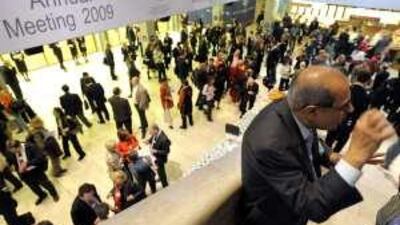DAVOS, SWITZERLAND // Financiers, politicians and business leaders jetted into the World Economic Forum's annual parley under snow-capped peaks to discuss the worst economic crisis in generations. They arrived to news even grimmer than expected: the IMF announced yesterday that the global economy would grind to a halt this year, as more than US$2 trillion (Dh7.34 trillion) of bad assets in the US hurt economies from Russia to China. Bank losses worldwide could reach $2.2tn, the IMF said, up from the $1.4tn it predicted in October. In addition, the IMF forecasts world growth will be 0.5 per cent this year, the weakest since the end of the Second World War. "Unless stronger financial strains and uncertainties are forcefully addressed, the pernicious feedback loop between real activity and financial markets will intensify, leading to even more toxic effects on global growth," the fund warned. The IMF forecasts US GDP will contract 1.6 per cent, Japan's will shrink 2.6 per cent and the euro zone will decline 2 per cent this year. Worst hit will be Britain, expected to contract by 2.8 per cent. "The world economy is facing a deep downturn," said the IMF. The fund urged "timely" passage of fiscal aid, saying "any delays will likely worsen growth prospects". So, can the so-called Davos Man deliver? There are many delegates from the Emirates, but analysts say they have come to drum up business, rather than to save the world. Sameer al Ansari, the chief executive of Dubai International Capital - one of the emirate's largest investment companies, which is owned by the ruler of Dubai and controls about $13 billion in assets - told Reuters TV that asset prices were at very reasonable levels but it was still too early to make big bets on long-term investments. He said the company saw opportunities but remained nervous of markets, describing the financial system as "broken". "There (is) going to be a great opportunity in the next year or two to acquire assets at historically unprecedented levels," Mr al Ansari said. "The region has to invest for the long term... choosing assets that represent good value for the region." But he added: "We're still very nervous about making some big bets. We see the financial crisis getting worse. The system as we know it is literally broken. We have to get money flowing again, we have to get liquidity flowing again, we have to get confidence back. That's going to take time, that's going to take two, three, four years." The UAE's listed envoys, including Mohammed Abdullah al Gargawi, Minister of Cabinet Affairs and the chairman of Dubai Holding, Abdulaziz al Ghurair, the Federal National Council speaker, and Sultan Ahmed bin Sulayem, the chairman of Dubai World, join more than 40 heads of state and government, 36 finance ministers and about 1,400 business executives. There was also dispiriting news from PricewaterhouseCoopers, which does an annual review of chief executive confidence. This year's results are the worst since the company began tracking outlook in 2003. "The speed and intensity of the recession has rocked the psyches of CEOs and created a global crisis of confidence," said Samuel DiPiazza, the chief executive of PricewaterhouseCoopers in New York. Joe Saddi, the board chairman and Middle East chief of Booz and Co, a management consultancy, said the UAE's "economic fundamentals" remain sound, but added that there "is no economy in the world today that can pretend to be insulated". "The Gulf, as a major financial centre, has a vested interest in ensuring the financial system emerges stronger from this," Mr Saddi told The National on the sidelines of Davos. "Many Gulf countries have tried to stabilise the situation, have earned the right to play a role and they have a duty to play that rule. They should push to play an active role in finding solutions." But while officials from the Gulf's sovereign wealth funds previously emerged as petrodollar saviours to cash-strapped western finance houses, Mr Saddi said they were likely to follow a more "cautious strategy" this year. A report this month by the New York-based Council on Foreign Relations revealed the value of foreign assets in GCC state portfolios fell by $100bn to a total of $1.2tn last year. The largest losses were suffered by entities from the UAE, Kuwait and Qatar, the three sheikdoms that were most aggressive in overseas acquisitions and the vast personal holdings of ruling families is also believed to have been severely dented. The Davos summit, organised under the bleak slogan "Shaping the Post-Crisis world", follows the meeting of the Group of 20 big and emerging economies in November. The G20 meets again in April ahead of a G8 leading industrial countries' summit in July. jreinl@thenational.ae

Grim news at Davos summit
Financiers, politicians and business leaders jetted into the WEF's annual parley under snow-capped peaks.
Most popular today

